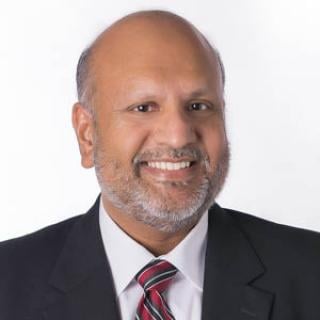As a medical student, do you ever wonder what it’s like to specialize in lifestyle medicine? Meet Ankush Bansal, MD, a board-certified lifestyle medicine physician, hospitalist and a featured physician in the AMA’s “Shadow Me” Specialty Series, which offers advice directly from physicians about life in their specialties. Check out his insights to help determine whether a career in lifestyle and hospital medicine might be a good fit for you.
“Shadowing” Dr. Bansal
Specialty: Lifestyle and hospital medicine.
Practice setting: Locum tenens hospitalist practice in Palm Beach Gardens, Florida; telemedicine.
Employment type: Independent contractor.
Years in practice: 12.
A typical day and week in my practice: My typical day is a 7 a.m. to 7 p.m. shift, where I start my day getting my census list with overnight admission assignments at a hospitalist huddle and then start seeing patients throughout the hospital. Depending on the hospital I’m at that day, I usually have a meeting with case managers in the morning. I spend the rest of the day seeing patients on the wards and intensive care units, as well as rotating through admissions and consults until the end of the day.
I also spend about one hour with one patient and family on most days talking about diet and lifestyle, since over 80% of all admissions anywhere in the country are due almost entirely to poor dietary choices, followed by substance-use disorders, lack of activity and other behavioral factors. This causes heart disease, hypertension, hyperlipidemia, heart failure, most gastrointestinal issues, some cancers—primarily lung and colon—and other conditions. In the evening, I do consulting or telemedicine work, although I do more of this on my nonhospital days.
Usually my week is seven days on, seven days off. Occasionally, I have to do nights—7 p.m. to 7 a.m.—but I do predominantly days only.
The most challenging and rewarding aspects of lifestyle medicine: The most challenging aspects are first, reeducating patients and families about the misinformation from the media, culture and other doctors about preventive medicine. Second, having to deal with the dysfunctional American health care system with respect to insurance denials, prior authorizations, unaffordability of medications for patients, lack of post-discharge care—especially psychiatric—and having to keep patients in hospitals for no reason due to private insurance requirements or the Medicare observation rule.
The most rewarding aspect I hear from patients every day is that they finally understand their condition and how it works, as well as the rationale for why the doctors are doing things the way they’re doing it. I’ve been told many times—at least once a week—that I finally explained things to them so they understand. Additionally, they are very appreciative of my dietary advice and how they can control many of their conditions and even reduce their medication burden in the future.
Three adjectives to describe the typical lifestyle medicine physician: Busy, versatile (every system, every acuity level, simple versus complex) and always communicating.
How my lifestyle matches, or differs from, what I had envisioned: It’s definitely busier than I expected. Twelve-hour shifts aren’t healthy or sustainable and while we counsel our patients about work-life balance, we don’t practice it ourselves. That is one major reason I do locum tenens exclusively—I set my schedule. If a hospital cannot accommodate that, I work elsewhere.
It makes my work-life balance doable such that I can do other activities like travel, go to meetings, get involved in advocacy, volunteer with nonprofits, do other work like consulting and telemedicine, teach, and even write articles and books. I am also able to care for family and friends and be more available to them. I still work a full-time-equivalent schedule, but on my terms. When I worked as an employed hospitalist, whether for a private group or for a university, I had no input into my schedule, workload, or ability to do other activities. I actually got burnt out more than once. Many hospitalists have felt this way.
Skills every physician in training should have for lifestyle medicine but won’t be tested for on the board exam: How to deal with hospital administrations (even when led by MDs or DOs) that many times view hospitalists as easily replaceable. The best skills to have beyond the science and team-based care is negotiation and business knowledge. It will help you in interacting not just with patients and families—who often can be difficult due to the stress of the reason for admission as well as being cared for a doctor they don’t already have a relationship with—but also dealing with the C-suite, your specialty referrals, and insurance companies who often deny care.
One question physicians in training should ask themselves before pursuing lifestyle medicine: Do you like the fast-paced, complex care in the inpatient setting in which you see acute complications of every organ system, interrelationships between organ systems, and frustrations with access to health care and misinformation about management of conditions? It frequently requires different and new approaches.
Books every medical student interested in lifestyle medicine should be reading:
- How Not to Die, by Michael Greger, MD. How to talk to your patients about the science and practical advice of nutrition, lifestyle, and prevention.
- An American Sickness: How Healthcare Became Big Business and How You Can Take It Back, by Elisabeth Rosenthal, MD. Learn about the problems of the American health system to understand what you may encounter as a hospitalist.
- The Nutrition Guide for Clinicians, by Neal Barnard, MD. Great reference on nutrition for counseling patients that hardly anyone is taught in medical school and residency.
The online resource students interested in lifestyle medicine should follow: Health Affairs website and blog, AMA news and The New York Times for health care policy issues that directly and intimately affect hospital practice.
More about choosing a specialty
The AMA’s Specialty Guide simplifies medical students’ specialty selection process, highlight major specialties, detail training information, and provide access to related association information. It is produced by FREIDA™, the AMA Residency & Fellowship Database®.




